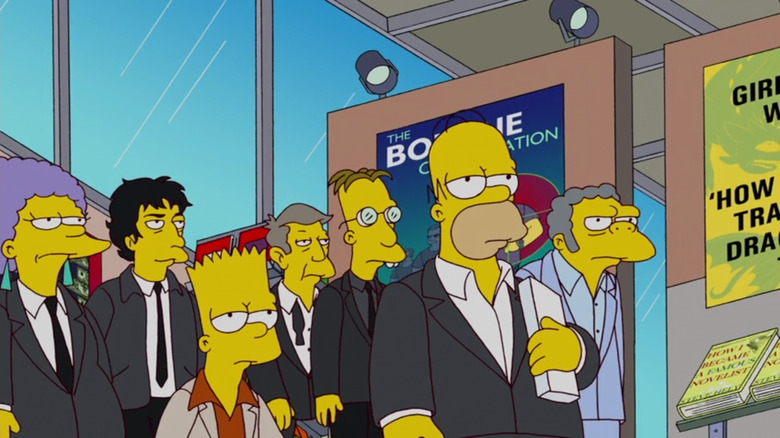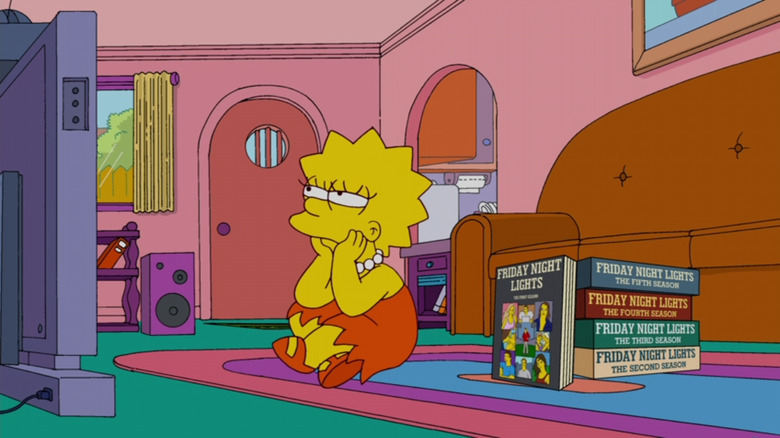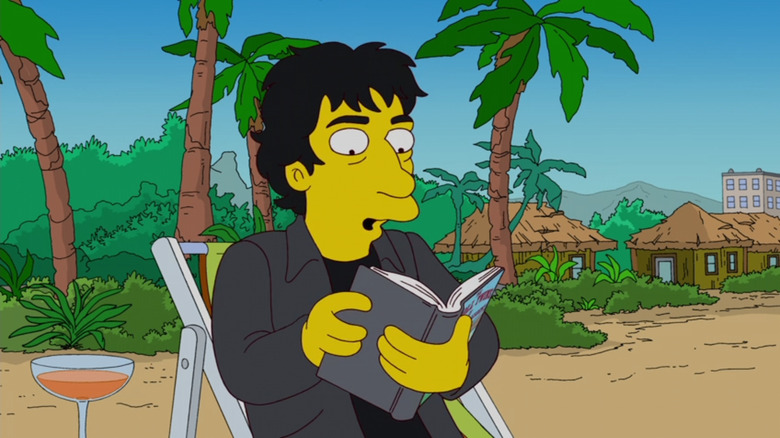The Sandman Creator Neil Gaiman Starred In One Of The Best Later Simpsons Episodes
Long before the Netflix adaptation of "The Sandman" dropped this month, Neil Gaiman made a huge name for himself with his comics, novels, short stories, and of course, the film and TV adaptations of his work. And in 2011, "The Simpsons" decided to give him a substantial role as himself in one of their episodes.
The season 23 episode "The Book Job" starts off with Lisa learning that the young adult industry is a sham. In the world of "The Simpsons," every popular kids' book is written by a team of underpaid lit majors and attributed to a fake author with a carefully manufactured inspirational backstory. She complains about this to Homer, which unintentionally inspires him to get in on the action. He assembles a team (made up of Bart, Selma, Professor Frink, Moe, and Principal Skinner) to shamelessly co-write a kid's novel based purely on what will sell the best.
Neil Gaiman also joins the team, but not to write. "Your job is to get us lunch," Bart tells him, "and lose the British accent." Gaiman makes a valiant attempt at an American accent ("Cheeseburgers, French fries. I'm all over that, pal,") but it's not very convincing.
Homer's a highlight
"The Book Job" works so well because of how good Homer is in it. Here he's a shameless crook who happily takes advantage of kids' underdeveloped literary tastes for a quick buck. As with past storylines where Homer's come up with a get-rich-quick scheme, he turns out to be surprisingly competent. It's not that Homer gets smarter in these episodes, so much as the world around him seems to lower itself to his level of intelligence.
The moment Homer begins his book scheme, the world starts adhering to the rules of a generic heist film. Bart's now characterized as Homer's longtime partner-in-crime, and the rest of the crew are recruited with an absurd level of ease. You'd think the show would have to jump through hoops to naturally get Professor Frink, Moe, and Patty interacting with each other, but no: it's simply established that they've all got nothing better to do, and they're all already familiar with other.
Beyond all the heist jokes, at its core, the episode's a contemplation on the difference between creating art and creating content. Lisa believes books should be personal and written from the heart; they should be something that only a singular person's artistic vision could create. The YA industry's approach, however, is to treat books purely in terms of potential profit. Homer's crew creates a book churned out by five different people at once, with every element included for the sole purpose of reaching the broadest audience possible. Yet as the episode goes on, it becomes clear that the situation is not so black and white.
Turns out, writing alone's hard
As soulless as Homer's methods seem, he undeniably gets results. Lisa spends most of the second act procrastinating in increasingly oblivious, over-the-top ways, whereas Homer's crew has a finished book ready in no time. As much as Lisa idolizes the idea of the author working on their own, it's rare for a work of fiction to ever solely be the result of one person. TV shows, after all, are usually written by a team. Neil Gaiman's "Sandman" series was always a group effort as comics tend to be. Even a novelist will work with plenty of beta readers and editors before the work is ready to be published.
So, it's not too surprising when it's revealed that Homer's crew have accidentally grown attached to their own book. It was supposed to be a shameless cash grab, but it's accidentally turned into something real along the way. The lesson is that a group effort can produce genuine art; corporate interference is the real problem. The head of the publishing company decides to change every aspect of the book that was even a little bit original, turning the story into yet another teen vampire book in a misguided attempt to make it a sure financial success.
After some heist-related mayhem, we get a happy ending where the crew's original book is published. The crew might not get the million dollars they were hoping for, but they have published a book they can be genuinely proud of. The only problem is that instead of having Lisa in the fake author bio on the back cover, it turns out she's been replaced by the one and only Neil Gaiman. In an episode filled with schemes and betrayals, this is a final, devastating switcharoo.
That crafty Neil Gaiman
Having fled the country to some tropical island, Gaiman gloats to himself, "I've heisted my way to the bestseller list once again. And the most brilliant part is, I don't even know how to read!" After an episode of Gaiman serving no other purpose in the writing group beyond getting everyone pizza, we find out from the man himself that his entire writing career has been a sham. He then poisons Moe for no real reason. So not only is Neil Gaiman a fraud, but he's also a murderer? This is now canon in the "Simpsons" universe.
It's a funny and fitting endpoint for the episode. As strange and disturbing as some of Gaiman's comics, books, and short stories are, they're all undeniably creative and personal. This last-minute plot twist around Gaiman, a man whose books serve as a clear contrast from the other generic young adult "content" being published, makes for a final cynical touch to the story. If even this guy's a crook, what hope does the rest of the industry have?
Season 23 of "The Simpsons" isn't a particularly beloved year for the show (it didn't even make /Film's "top 20 seasons" list), but this episode's widely considered a gem by the fans who still tune in each week. Neil Gaiman didn't write the script, but his presence alone certainly seemed to help.
If you want to see more of him in "The Simpsons," you can also check out season 29's "Treehouse of Horror XXVIII," where Gaiman voices Snowball V in a parody segment of "Coraline." These are the only two episodes Gaiman's done voicework on, but perhaps they'll invite him back for a "Sandman" segment in some upcoming "Treehouse of Horror." We can always dream.



